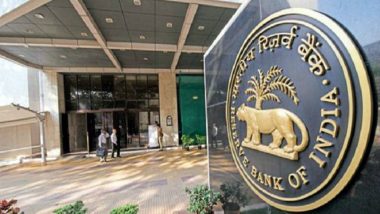Mumbai, December 6: In a bid to promote digital transactions, the RBI on Friday said round-the-clock transactions will be allowed under the National Electronic Funds Transfer (NEFT) system from December 16. The 24X7 NEFT system will be available on all days of the year, including holidays, it added.
NEFT transactions are settled in hourly batches. For weekdays, the batches are from 8 am to 7 pm. On first and third Saturdays, the settlement happens from 8 am to 1 pm. In a notification, the central bank said it has been decided that the facility on NEFT system shall be made available from December 16, 2019 on 24X7 basis. Reserve Bank of India Slaps Rs 1 Crore Fine on Indian Bank for Violating Cyber Security Norms.
The first settlement will take place after 00:30 hours on December 16, 2019 (night of December 15, 2019). The RBI has asked the member banks to keep adequate liquidity in their current account with the regulator at all times to facilitate successful posting of NEFT batch settlements.
NEFT transactions after usual banking hours are expected to be automated transactions initiated using 'Straight Through Processing (STP)' modes by the banks. The existing discipline for crediting beneficiary's account or returning the transaction (within 2 hours of settlement of the respective batch) to originating bank will continue, it added.
Besides, member banks will ensure sending of positive confirmation message for all NEFT credits and all provisions of NEFT procedural guidelines will be applicable for 24x7 transactions as well, it added. "Member banks are also advised to initiate necessary action and ensure availability of all necessary infrastructural requirements at their end for providing seamless NEFT 24x7 facility to their customers," the regulator said.
Banks may disseminate information on the extended timings for NEFT to all their customers, RBI said. From July 1 this year, RBI had decided not to levy charges on transactions through NEFT and Real Time Gross Settlement (RTGS) system in order to promote digital transactions in the country, and asked banks to pass on the benefits to the customers.
Earlier, the RBI used to levy minimum charges on banks for transactions routed through RTGS and NEFT. Banks, in turn, levy charges on their customers. RTGS is meant for large-value instantaneous fund transfers, while NEFT is used for fund transfers of up to Rs 2 lakh.













 Quickly
Quickly


